That evening, Lord Aritaka summoned his family and bannermen to the central keep for the promised banquet. They formed ranks in long rows seated before the serving tables, the men dressed in fine robes bearing their family’s crests, the women draped in colored layers. The meal was served in several courses, consisting of rice, soup, grilled fish brought fresh from the eastern caravan, pickled vegetables and dried plums—a lavish affair for samurai far removed from the capital. It spoke to the lofty aspirations of the host and that significance was lost on none.
Kazuchiyo was seated across from Hidemune, and thus endured a great deal of narrow-eyed glares throughout the meal, even a few from his mother. Contrary to his fears, Mahiro contained her typically savage good humor to the occasional guffaw, her restraint in no small part owed to the Lady Satsumi seated beside her. As was Satsumi’s way she soothed and engaged with a near flirtatious elegance that earned her Mahiro’s attention most of the evening; and, more to her goal, Lord Aritaka’s relief and appreciation.
Partway through the meal, Lord Aritaka motioned for silence, and the assembly was swift to comply. Each already knew what he meant to say, and listened with rapt anticipation. Even Kazuchiyo leaned forward to get a proper view.
“In three weeks time, construction on the new armaments to Castle Ninari will be complete,” he declared. “I will be traveling to the castle myself in order to oversee the final outcome of their work, and with me will travel six of my generals, as well as two thousand of our soldiers and their families from around Sakka province, to reside in the nearby towns and foothills.”
The six generals he spoke of, including General Waseba, bowed their heads in acknowledgement. “Also accompanying me,” Aritaka continued on, “will be two of my children, Mahiro and Kazumune. In our absence, Hidemune has complete authority of Gyoe, and the remainder of you will heed his every command.”
“Yes, sir!” the gathering said in unison, bowing their heads.
“Very good.” Lord Aritaka lifted his cup to them. “Here’s to Master Utsukawa and his brave men at the border.”
They all drank, and Kazuchiyo as well, hoping the saké would help drown his thundering heart, at least in the moment. There could be no mistaking Aritaka’s intentions that night: he was preparing each of them for war.
As the gathering finally dispersed late into the evening, Kazuchiyo fulfilled a promise by seeking out Master Iomori, who had remained at her lord’s side all through the meal without a word. “Master Iomori,” he greeted, and when he bowed, she bowed lower.
“You needn’t show such deference to me,” she said, though with very little actual humility. “You are the lord’s son, as I continue to remind you.”
“I myself am not yet lord of anyone,” Kazuchiyo replied, hopeful that any thought to Amai’s taunting did not show too plainly in his face. “And I owe you my life, which you also continue to remind me of. Often.”
Iomori’s lip gave a quirk that some might mistake for a smile. “Let us hope you don’t waste that life I’ve given you at the border,” she said as they made their way toward her chambers in the east tower. “Gyoe has been treacherous enough for you. I fear what might become of you so far from home.”
“If treachery can reach me within the walls of Father’s newly fortified castle, that would not reflect well on General Utsukawa’s craftsmanship,” said Kazuchiyo.
“No indeed.” Again, Iomori betrayed a glimpse of near-human amusement. “But you are a clever young man. I know you can handle yourself, and you have powerful allies awaiting you there.”
The thought of Yagi-douji prowling the halls of the border fortress filled Kazuchiyo with eagerness difficult to maintain. “Will you not be joining us?” he asked to change to subject, if only slightly. “I would feel more at ease if you were accompanying us.” He watched her closely. “And away from Lady Satsumi.”
Iomori fixed him with a sharp eye. “You don’t need to play word games with me, Lord Kazumune. You can speak your mind.”
“I’d like for you to leave Lady Satsumi alone,” Kazuchiyo obliged her. “I know you’re acting in my interests but I don’t want to see her suffer because of me.”
Iomori held her tongue as they passed a few servants, waiting until they were in relative privacy again. “If she bears a child it will be O-ran that suffers. You would be satisfied with that outcome instead?”
As they reached the tower, Kazuchiyo allowed Iomori to take the lead. “My very existence is suffering to Mother,” he said as they ascended. “Any child of Lady Satsumi’s cannot harm her more than me. Will you please leave her be? If for no other reason than I ask it of you?”
Iomori stopped, turning on the stairs to look down at him. With only dim evening light easing through the tower’s windows on the floor above, her silhouette was tall and striking. “Is that an order?” she asked.
Kazuchiyo stared up at her, and not for the first time felt his courage falter before her. She was testing him and he was loathe to fail—the potency of her disapproval had always been fierce. He squared his shoulders nonetheless. “Yes,” he said. “It is.”
Iomori did not reply at once, as if waiting for him to retract. When he did not, she gave a short nod and turned to continue up the stairs. “Very well. I’ll interfere with the ladies no longer.” She chuckled, then, her voice raspy. “Ah, it so does remind me of court.”
Kazuchiyo followed close behind up to her chambers. “You were at the Emperor’s court?”
“Did I never tell you that? Well, it was very long ago.” She let them into her room and guided him to a far closet, disguised by a hanging scroll. “But never mind that now. I have something for you.”
Iomori removed the hanging scroll to set aside and then slid away the panel behind it, revealing a stock of small boxes and writing supplies. It was less carefully arranged than Kazuchiyo would have thought for a woman of Iomori’s bearing. First to be retrieved from the piled collection was a folded paper which she handed to him with very little ceremony. “This is a messenger shiki,” she explained. “If ever you have need to contact me—from the border, especially—write a message on the paper inside, fold it back up, and set it outside. It will reach me.”
“Less conspicuous than sending a falcon,” Kazuchiyo said, appreciative. He tucked the paper into his robe. “I thank you.”
“I’m not finished.” Iomori reached back into the the closet, and despite the stacks of items, she plucked a small box out of the slew as easily as if someone on the inside had presented it to her. The box was made of simple wood with no engravings, and when she opened it, Kazuchiyo was puzzled to find the inside lined with some kind of thin, tempered metal. It was full of small, lacquered beads of various earthy colors, each with a length of dark ribbon laced through it.
“Hold out your arm,” she said as she selected a small red bead from the rest.
Kazuchiyo did so, pushing back his sleeve. The red reminded him of Tatsutomi banners, and when Iomori pressed the bead to the inside of his wrist, goose bumps rippled up his arm. “If I’m seen wearing this color—” he began to say.
“Don’t fret,” Iomori interrupted, and as she wound the ribbon around him, she was sure to disguise the bead beneath it. “If anyone asks, you can tell them it was a blessing from me.” Once she had finished tying it off, she met Kazuchiyo’s eyes and held them with unblinking intensity. “Wear it as often as you can,” she said. “It just might save your life.”
She let him go, and as Kazuchiyo drew his arm back to his side, he shivered at the almost imperceptible weight of it. “Thank you, Master Iomori. Even if you are not traveling with us to Ninari, I know you are with me.”
“No more pretty words,” Iomori said. “I’m only doing my duty.” She bowed to him, and following her lead, Kazuchiyo’s bow was shallow by comparison. “Good night, Lord Kazumune.”
“Good night, Master Iomori.”
Kazuchiyo departed, and his heart beat swiftly all the way back to his own chambers in the main keep. In five years he had never owned a piece of red clothing for fear that it would speak too openly of his continuing devotion to his Tatsutomi kin. He could never be seen with a dragon motif of any kind, was in possession of nothing crafted in Suyama save his mother’s old lullabies. Even just a small red bead tucked against his wrist was the greatest declaration of loyalty he had ever kept outside his own heart, and it filled him with exhilaration and terror in equal measure.
Once back in his room, Kazuchiyo shut himself in and changed quickly into his sleeping robes. He curled up beneath his layers of bedding and there tried to catch his breath after a long day of stirring revelations. Running his thumb back and forth over the hidden bead, he thought of the road through the mountains that would take him to Castle Ninari, and the dangers he might face there. He thought of Lady Satsumi at war with her own security, of Mahiro’s struggles to impress their father, of Iomori’s mysterious gifts. He thought of a pale-eyed shinobi caressing the inside of his wrist, and wondered with a knot in his stomach if his message would provoke a response—wondered why it mattered to him at all.
But mostly, he thought of Yagi. He repeated the description from the letter over in his mind, remembering the tremor in the script. He well recalled his own shudder of awe at first meeting Yagi, and it was so easy for him to draw memories of the man back to him: his broad back, his sturdy limbs, his palms wide as a bear’s and eyes fierce as a wolf’s. Kazuchiyo had always believed that in their time apart his champion had grown only more fierce. Emboldened by the details from Satsumi’s brother, his imagination supplied him vibrant speculations of a beast of a man, bearing great beams of heavy wood across his bare, muscular shoulders.
Soon, they would be reunited, and his anticipation for that meeting fueled in him eagerness that easily gave way to arousal. With every effort toward quiet he slipped his hand down between his thighs, pleasuring himself with the fantasy of a firm chest and heavy breath at his back, five coarse fingers wrapping him up.
In the morning, after a night of shallow sleep, Kazuchiyo stirred from his bedding and discovered almost immediately that a piece of folded paper lay beside his pillow. He jolted upright but then hesitated, his heart fluttering. He never would have expected a reply so soon, and he turned to and fro, seeking some evidence in the room of an intruder. Finding none besides the paper itself, he at last reached out and drew it toward him.
It was the same paper that he had delivered to the alcove, and alongside his message from the day before was written the lines:
Good thing the fox only needs
wit to escape the hunter.
It was not the most elegant poetry, following only the basic rules of format and written in brush strokes that would have infuriated Gyoe’s tutors. Kazuchiyo shivered all the same, even licked his lips as he reread the simple lines over and over. His black fox had responded, was taunting him. This fact alone meant something. Perhaps if he pressed a bit more, he could tease from the responses some insight as to the man’s nature and intentions.
But first, he would have to be very certain of his response. He hurried to gather brush and ink as possible verses coursed through his mind.

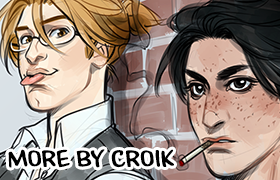
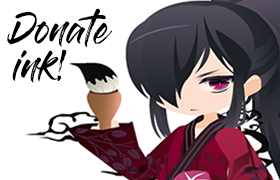
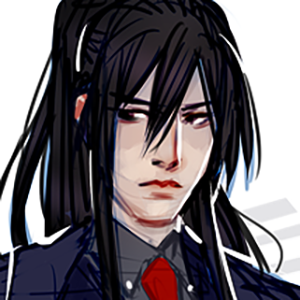
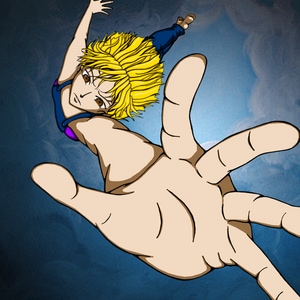







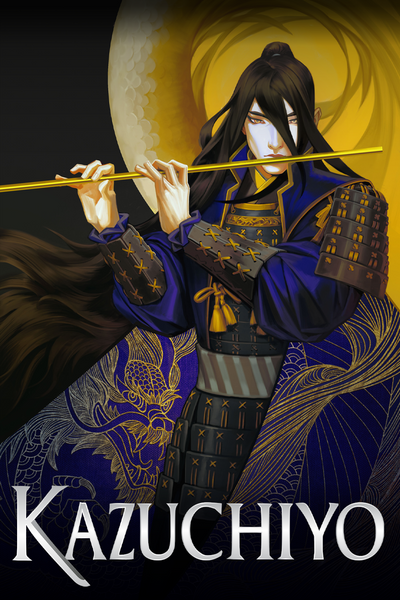
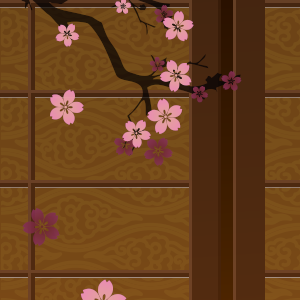
Comments (3)
See all